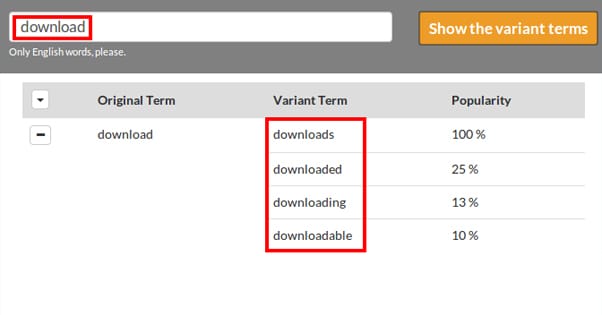How Many Times Should You Include Keywords in Your Post
Published by James Parsons • Search Engine Optimization • Posted August 18, 2016 ContentPowered.com
ContentPowered.com
Keywords are very important to modern day SEO, but not in the way you might think. Part of the reason people get a false impression, though, is because they’re reading information about it online without regard for publication date.
Forgive me while I go off on a slight tangent before we’ve even begun. The web is a great place full of amazing information on pretty much every subject imaginable. One of the most brilliant parts of it is that in large part nothing ever really disappears. You can find the exact specifications for a product that hasn’t been manufactured in 15 years. You can find ancient blogs and forums. Even if it’s not live, archives like the Wayback Machine keep caches.
At the same time, though, this hurts modern folks who aren’t paying enough attention. In a fast moving field like SEO, changes can be big and abrupt. Techniques that worked a few years ago – say, 2010 – no longer work today. If you’re reading an old post about how to get ahead, and it’s giving you advice based on the internet from the early 2000s, you’re going to be in for a bad time. A lot of those techniques not only no longer work, but they can also irrevocably damage the potential of a site.
I bring all of this up because the proper usage of keywords in content is one of those things that has changed a lot over the last decade, and using out of date information to determine how to use them is likely to hurt you. It won’t be entirely devastating unless you dig into keyword stuffing or something of that nature, but it certainly won’t help you.
Keyword Density
Keyword density is the name for the concept of using your target keyword a certain number of times, depending on how long the post is. For example, you might be aiming for a keyword density of 4 per thousand. That means in a 1,000-word blog post, you want your exact keyword mentioned four times.
I most frequently see this concept used on low-tier ghostwriting platforms, like Textbroker. Textbroker, in fact, has a system in place that allows clients to require keywords used at certain densities, and won’t process an article without them.
Using an example of 4 per thousand is actually a very light number. I would often see people requesting a density of 4 per 250, or even more. This grows dangerously close to keyword stuffing, and it comes with an associated mistake.
See, a single keyword may actually be a key phrase, a long-tail target keyword that is made up of as many as half a dozen individual words. When you use one word five times in 500 words, it can be a little crowded, but it’s not too bad. On the other hand, if you use a six-word phrase five times in 500 words, it becomes a lot more intrusive.
Part of the reason for this is simply that long tail phrases are harder to work into specific sentences.
The fact is, specific keyword density is no longer an important factor in SEO. Google doesn’t care, so long as you’re not going over a certain threshold of readability. In fact, doing this could even hurt you. Keyword usage should be natural. You can tell that this post is about the number of times you should use a keyword in a blog post, but you don’t see me mentioning an exact phrase related to that 20 times throughout the post. And yet, you can find this post highly ranked in Google search for the concept.
Semantic Search
Part of the reason this works is because of what is called Semantic Search. Semantic Search is a way of parsing language using meaning rather than vocabulary. It’s a way of using natural language rather than a “search engine dialect” to parse queries.
For example, if you wanted to find out what the best pizza place in Chicago is, you have two ways of asking Google. You might type in an optimized query, something like “Best pizza Chicago.” This is optimized based on your years of using the internet, and your knowledge of how search engines used to work. In the past, if you used extraneous words, the search engine would often strive to include sites that used those words, and would serve you sub-par results because of it. If you used different words, you might miss the main target of your query because the actual information didn’t use that word.
This lead to a world where as a searcher, you would have to pare down your query to the basic keywords you wanted to find. At the same time, any marketer who wanted you to find them would have to guess what query you would want to use – educated guessing via keyword research – and would have to use that exact keyword. It was a sort of back and forth evolution of a search specific language.
This is why older folks, used to being able to ask people directly, had a harder time using search engines. They would type in full questions, like “what is the best pizza place in Chicago?” With the old style of search parsing, they would only get sites that used that exact phrase, which might not have been the top value results. In fact, often times shady marketers would use such plain language queries to post sketchy websites targeting older people directly.
These days, if you type in a full question, the “old person query” into Google, you will get accurate and valuable results. This is because Google isn’t just looking for sites that match the words used. They understand enough about language to look into the substance behind the query, and pull out the exact meaning of what you want to find. Then they present you with the websites that answer your question, even if those websites don’t actually have those specific words in them.
Part of the reason for this revolution is the introduction of voice assistants like Siri, Cortana, and OK Google. When you use one of these assistants, the idea is that they act like real people or intelligent AIs, that can interpret what you’re saying and give you a relevant answer in a human way. The power behind that is semantic language parsing.
The Modern Way of the Keyword
Modern keywords are not meant to be an exact science. Keyword research is great, and it still works as a way to get ideas and a core focus, but they aren’t the be-all and end-all of SEO like they used to be.
Rule #1 with keywords is that you shouldn’t worry about close variations. There are two facets to this. The first is that you don’t need to strive to keep variations out of your articles in an effort to keep them pure. All you’re doing is making it a little harder for people using less common turns of phrase to find you. I’ve said before that you don’t need exact phrases to show up in search, but it helps on a small level to have them.
The flip side is that you don’t need to strive to include every one of the variations you can think of. Google understands language well enough to grasp synonyms, and will be able to find valuable articles despite lacking the presence of certain keywords. If you write a post about great pizza joints in Chicago, and someone runs a search for the best pizzerias in Chicago, your post will still show up because Google understands that pizzeria and pizza joint are pretty well the same.
One word of caution here is that you cannot get away with creating a dozen posts about the same topic using slightly different keywords. Google will see that you have all of these very similar posts on your site and they will all become less valuable in the eyes of the search engine. If you wrote two top 10 articles about pizza in Chicago, one using pizzeria and one using pizza joint, and they have the same 10 places on them, Google knows what you’re doing. One or both of those posts will be more or less ignored.
Rule #2 with keywords is that you don’t need to care about density. Seriously, if you’re at any point considering counting the number of times you used a keyword in your post, and it’s for anything other than an experiment to prove that keyword density is valueless, you need to stop, take a step back, and reevaluate your entire marketing strategy.
The number one purpose of a keyword is to give your post a central focus. The keyword is the topic you’re writing about. Beyond that, it’s just something you need to use naturally as you write. If you’re actually writing about the topic, it’s going to come up. That’s just how writing works. Sometimes you’ll need to write with a high degree of specificity, which will require using the keyword more often. Sometimes you don’t need to be specific and can indirectly reference it. So long as it’s present, it’s all you need.
Rule #3 with keywords is that you need to provide value centered around the topics. Value, as determined by a combination of Google’s intelligent analysis, their human representatives, and the response in terms of links and social sharing, is what determines how well a post does. Google isn’t just randomly choosing which posts to promote, after all.
Whenever I choose a topic to write about, the first thing I do is look at the other posts out there about the same topic. I consider what they say, what perspectives they take, and how deep they delve into the topic. Then I get to work outlining my own post, in a way that can either use theirs as a starting point and a reference, or can cover the same ground in a more detailed, better way. I go from there to work on the post, to make it an improvement in value over what currently exists. The last thing I need to care about is the specific number of times I use a random keyword.
Rule #4 with keywords is that you should use specific keywords in meta data. Meta data is like the elevator pitch for your post, and it’s meant to be a quick description of what it’s all about. That means it’s a prime location for your actual keyword. Include it specifically, in a paragraph that explains the context, and you’re good to go. You don’t need to include it more than once, because you don’t have space and it’s redundant.
Get it Together
The final answer to the title question still has yet to be expressly said, though, right? Well, there is no one answer. There’s no one number that works for any given post. The answer, in plain English, is “you shouldn’t focus on including keywords a certain amount of times”. If your sentence works smoothly with the keyword, and it doesn’t make the keyword show up too many times in the same paragraph or the same page, go ahead and use it. If using the keyword would make it appear too many times on the same page, use a variation or skip it. If your article is about the keyword and topic you are trying to rank for, you will rank for it.
Unfortunately, this means you need to have a writer fluent in web English. This is where a lot of ESL speakers tend to fall flat; they don’t have the keen sense of how a sentence sounds when they write it. It may be grammatically correct, more or less, but technical proficiency is not the same as fluency.
Hiring ghostwriters can help this, as long as you find good ones, but that’s a tricky proposition itself. You need to find people who are talented and experienced in web writing, and that means you need to know what you’re looking at to review their work. You also, of course, need to pay them, and that’s a whole other issue.









Great post man! This was easy to read. And I learned something new and very useful.